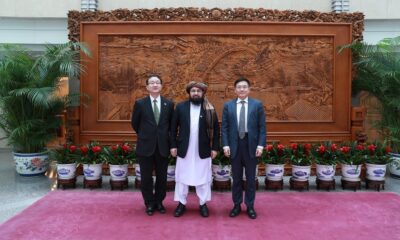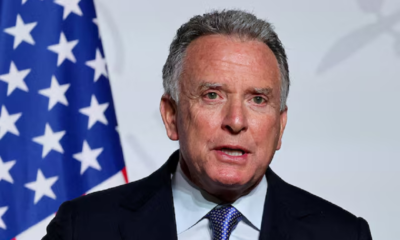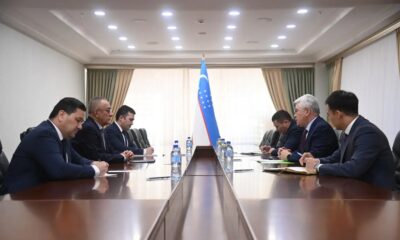Latest News
Habiba Sarabi the lone woman in a room full of men at Moscow meeting
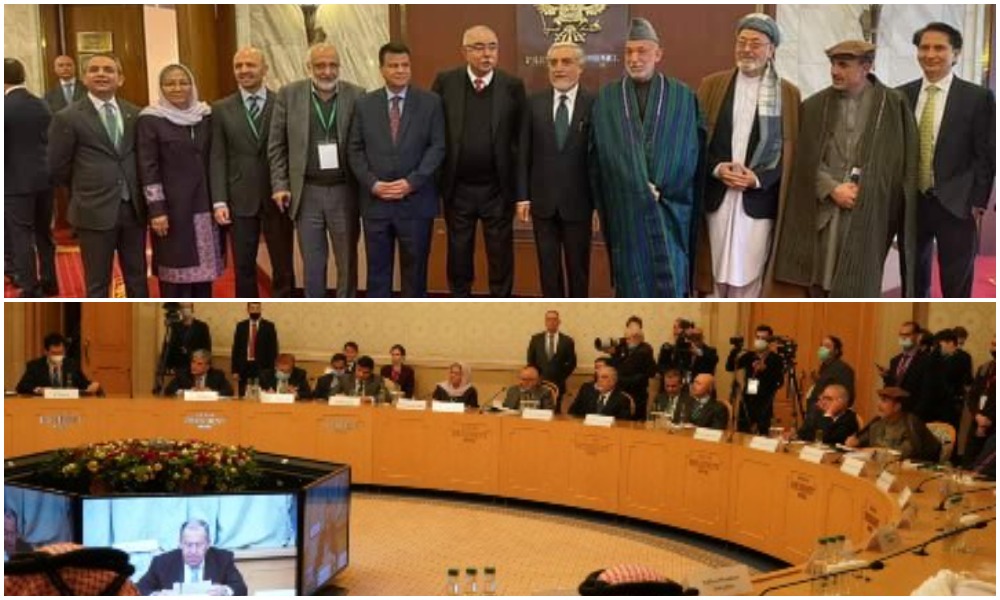
Despite repeated pledges by the Afghan government and the country’s politicians to include women in decision making processes, Thursday’s grand meeting in Moscow on the peace process indicated otherwise.
As delegates filed into the meeting room – it quickly became clear that among the dozens present, all were men – except for one.
Habiba Sarabi was the only female among the Afghan delegates – which included the Afghan government, the Taliban and individuals from Afghanistan who were sent invitations by Moscow.
Sarabi was the lone female voice in a room full of men.
In a tweet after the meeting, Sarabi made her feelings on the matter clear and said in reference to the Turkey meeting in April: “I hope I will not be the only woman at the next summit.”
Coming out in support of Sarabi was Nader Nadery, a fellow Afghan Republic peace talks team member, who said after the meeting that Sarabi “said in her remarks to the room full of men: why I should be the only woman in the room? We have not been part of the war, we can certainly contribute to peace. 51% of people should not be ignored. Hope hosts take note of it for the future.”
Nadery also stated that he hopes an “equal number of women on tables should become the norm. Proud of Sarabi Habiba.”
Shaharzad Akbar, chairperson of the Afghanistan Independent Human Rights Commission (AIHRC) also questioned this imbalance.
She said in a tweet: “Based on media reports, some of the invitations for Moscow event were delivered to specific individuals. Why didn’t Russia include a single Afghan woman on that list? There was also an invitation to Afghan government presumably, why wasn’t that invitation utilized to send four women negotiators?”
Even Ashraf Haidari, Afghanistan’s Ambassador to Sri Lanka, weighed in. He said in a tweet: “The presence of articulate women slowly diminished in peace meetings. Their substantive input and leadership in any peace engagement is naturally needed, as they speak for two thirds of any population, including children they nurture. Moscow wouldn’t care. Every Afghan must!”
This sentiment was shared by many including Human Rights Watch interim co-director, women’s rights division Heather Barr who quite bluntly said: “So easy for all the men – of varying, but not too varying, levels of misogyny – to snuggle up and make friends when they only let one woman in the room.”
Even Lyse Doucet, the BBC’s Chief International Correspondent commented. She said: “Strong voices of Afghan women. Is that why they don’t want more at the table?”
Soon after the start of the intra-Afghan talks in Doha, in September last year, Oxfam, Cordaid and InclusivePeace released a report stating that nearly 80 percent of Afghanistan’s peace tables, since 2005, have excluded women.
At the time, the report stated that without the meaningful participation of women, any sustainable peace efforts are at risk of failure.
The joint report Because She Matters, highlighted tangible ways to ensure women’s propositions and concerns are reflected in the negotiation process. It also showed that peace is more attainable when women have a place at the table, as peace agreements are 35 percent more likely to last beyond fifteen years when women effectively engage in them.
“Continued exclusion of women from Afghanistan peace efforts and decision-making will not only jeopordise the realisation of a true and sustainable peace, but blatantly disregard women’s rights to define their own future. We fear hard-won gains in women’s rights could be reversed”, said Ashish Damle, Oxfam’s Country Director in Afghanistan.
“Continued exclusion of women from Afghanistan peace efforts and decision-making will not only jeopordise the realisation of a true and sustainable peace, but blatantly disregard women’s rights to define their own future.”
During the meetings between the US government and the Taliban in Doha in February last year that set the stage for the start of the intra-Afghan peace process in September, not one woman was included in the conversation; and consequently women’s rights were not mentioned in the resulting deal struck a year ago.
“Despite seeing a small number of Afghan women represented in peace processes, Afghan women’s voices are largely marginilized. The intra-Afghan peace process, at all stages and levels, needs to do much better,” added Damle in September last year.
Latest News
Afghans among top asylum seekers in Russia in 2025, report shows

Afghan citizens were among the top three nationalities applying for asylum in Russia in 2025, according to new statistics reviewed by TASS. The figures show that 281 Afghan nationals submitted asylum requests during the year, placing Afghanistan in the third-highest position.
The data shows that Syrians ranked second with 3,196 applications. The highest number of requests came from Ukrainian citizens, who filed 3,332 applications in 2025—slightly lower than in previous years but still the largest group overall.
Uzbekistan (176 applicants) and Germany (129) also appeared among the top five nationalities seeking asylum in Russia last year. Overall, 8,220 foreigners applied for temporary asylum in 2025, an increase of 1,341 compared to 2024.
Temporary asylum in Russia grants legal residence, permission to work without a permit, access to medical care under compulsory insurance, travel documents, education opportunities, and financial assistance. It is also considered the first step toward securing a temporary residence permit and eventually Russian citizenship.
Latest News
IEA ambassador meets top Chinese diplomat for Asia
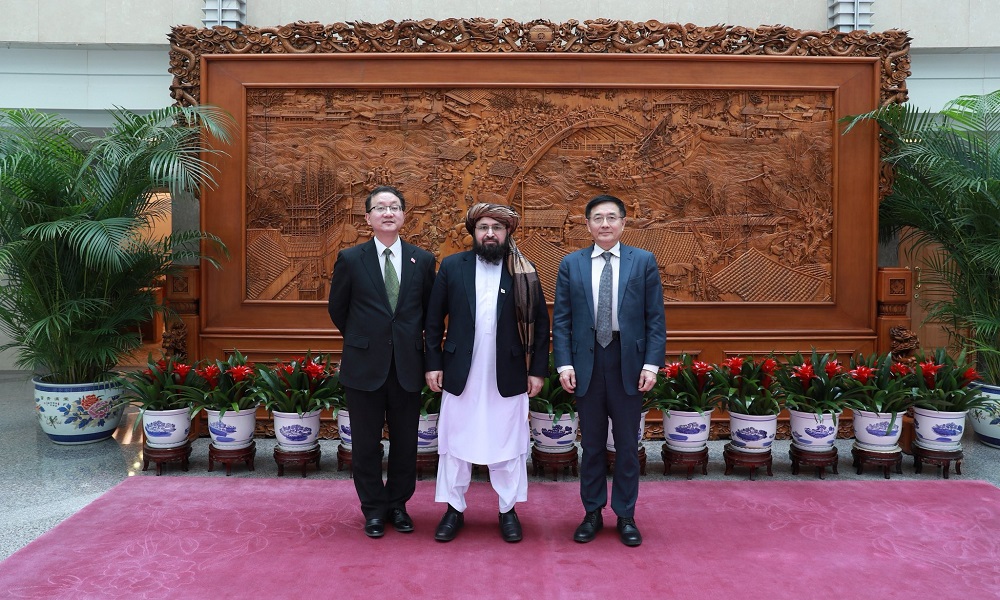
Bilal Karimi, the Ambassador of the Islamic Emirate in Beijing, met on Thursday with Liu Jinsong, head of the Asian Department of China’s Ministry of Foreign Affairs, and Yue Xiaoyong, China’s Special Representative for Afghanistan. The officials discussed political, economic, and commercial relations between the two countries, the activation of the Wakhan corridor, consular affairs, and other related issues.
According to a statement from the Embassy of Afghanistan in China, Karimi praised China’s positive stance toward Afghanistan and considered cooperation between the two countries necessary.
The statement added that Liu and Yue, while respecting Afghanistan’s independence, territorial integrity, and sovereignty, also emphasized the continuation of cooperation.
Latest News
Afghanistan facing deepening hunger crisis after US Aid Cuts: NYT reports

Afghanistan has plunged deeper into a humanitarian crisis following sharp cuts to U.S. aid, with child hunger at its worst level in 25 years and nearly 450 health centers forced to close, the New York Times reported.
According to the report, U.S. funding — which averaged nearly $1 billion a year after the Islamic Emirate takeover in 2021 — has largely evaporated following the dismantling of the U.S. Agency for International Development (USAID) under President Donald Trump.
The World Food Program (WFP) estimates that four million Afghan children are now at risk of dying from malnutrition.
The aid cuts have hit rural areas particularly hard, leaving families without access to basic health care. In Daikundi province, the closure of local clinics has been linked to preventable deaths during childbirth and rising child mortality.
Nationwide, more than 17 million Afghans — about 40 percent of the population — face acute food insecurity, with seven provinces nearing famine conditions, the report said.
The crisis has been compounded by mass deportations of Afghan refugees from Iran and Pakistan, deadly earthquakes, and ongoing drought. While other donors and Afghan authorities have tried to fill the gap, their efforts fall far short of previous U.S. assistance, the NYT reported.
Humanitarian groups warn the impact will be long-lasting. Researchers cited by the New York Times say sustained malnutrition could damage an entire generation, with consequences that cannot be reversed even if aid resumes in the future.
However, the spokesperson of the Islamic Emirate, Zabihullah Mujahid, considers the findings of this report to be inaccurate and said that the situation in Afghanistan is not as dire as it is portrayed, and that the country’s situation is moving toward improvement.
“In our view, this report is not correct. We have gone through difficult times and experienced problems such as a humanitarian crisis. At one point, we suffered very heavy casualties and our people faced many difficulties, but now the situation of most people is improving. The country’s economy is moving in a positive direction, to some extent job opportunities have been created for unemployed people, efforts are still ongoing, and Afghanistan’s economic resources have been revived,” said Mujahid.
-
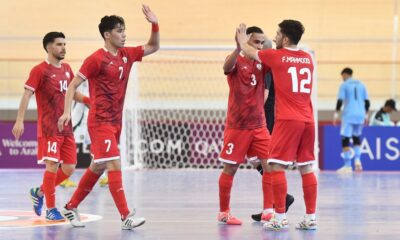
 Sport5 days ago
Sport5 days agoAFC Futsal Asian Cup: Afghanistan to face Iran in crucial Group D clash
-

 Sport4 days ago
Sport4 days agoAFC Futsal Asian Cup 2026: Final eight confirmed
-

 Sport4 days ago
Sport4 days agoAfghanistan in new kit for T20 World Cup warm-up against Scotland
-

 Sport5 days ago
Sport5 days agoIran see off spirited Afghanistan to finish top of Group D
-
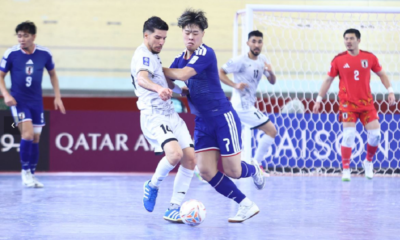
 Sport3 days ago
Sport3 days agoJapan trumps Afghanistan 6-0 in AFC Futsal Asian Cup quarter-final
-

 Sport2 days ago
Sport2 days agoHosts and heavyweights advance as AFC Futsal Asian Cup reaches semifinals
-

 International Sports4 days ago
International Sports4 days agoPakistan to boycott T20 World Cup group match against India
-
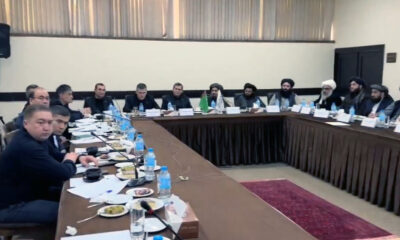
 Latest News5 days ago
Latest News5 days agoAfghanistan, Turkmenistan discuss TAPI, rail and power projects in Herat meeting




